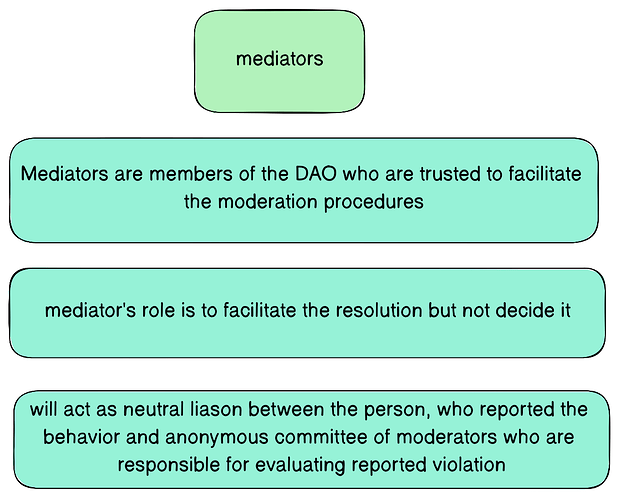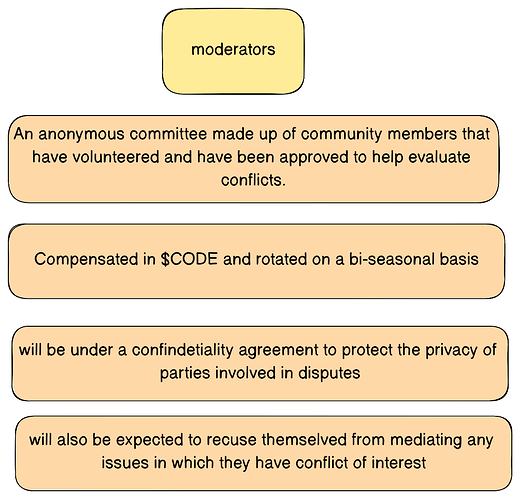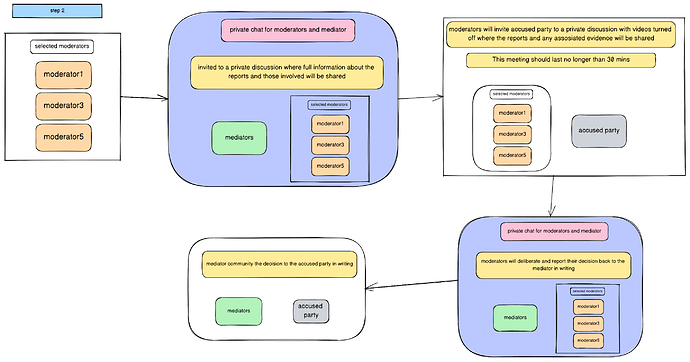This is a very early draft of the updated Code of Conduct and moderation procedure for handling violations. Given the impact of this proposal, sharing to invite feedback before a final draft is put through DDIP.
See attribution for inspirations for this at the bottom of the post. There is also a temp check vote to see which of the two proposed moderation procedures folks think is best.
One very important question:
- How do we select a representative group of people to be in the moderator pool?
–
[DRAFT] D_D Code of Conduct and moderation process
Authors: x x x x x
View the discussion from the last stage of the proposal here. (provide a link)
Summary
This proposal implements a new Code of Conduct (CoC) for the DAO and a clear process for how violations of this CoC are handled which all members will be bound to on the passing of this proposal.
Motivation
For Developer DAO to live by its values and provide a safe environment for all members it is critically important we not only have a C oC but also a clear way for folks to report violations and a process for action to be taken so that everyone can understand what they are adhering to.
Such processes are never perfect as we’re dealing with humans but not having a process ensures we’re unable to adhere to our values.
Our values are defined as:
- Transparency (open source everything, conversations in public, document and share journey)
- Diversity and Inclusion (seek to foster as diverse a membership as possible and support everyone to contribute)
- Responsibility (as a self-governed community we rely on members to be personally responsible for their actions and commitments to the community)
- Kindness and empathy (we know that we are living in a complex, stressful, and diverse world and go out of our way to make people’s lives and days better through our interactions)
Scope of Work
Our pledge as members of the Developer DAO
We as members, contributors, and leaders pledge to make participation in our community a harassment-free experience for everyone, regardless of age, body size, visible or invisible disability, ethnicity, sex characteristics, gender identity and expression, level of experience, education, socio-economic status, nationality, personal appearance, race, caste, color, religion, or sexual identity and orientation.
We pledge to act and interact in ways that contribute to an open, welcoming, diverse, inclusive, and healthy community.
Our Standards
Examples of behaviour that contributes to a positive environment for our community include:
- Demonstrating empathy and kindness toward other people
- Being respectful of differing opinions, viewpoints, and experiences
- Giving and gracefully accepting constructive feedback
- Accepting responsibility and apologizing to those affected by our mistakes, and learning from the experience
- Focusing on what is best not just for us as individuals, but for the overall community
Examples of unacceptable behaviour include:
- The use of sexualized language or imagery, and sexual attention or advances of any kind
- Trolling, insulting or derogatory comments, and personal or political attacks
- Public or private harassment
- Publishing others’ private information, such as a physical or email address, without their explicit permission
- Other conduct which could reasonably be considered inappropriate in a professional setting
Scope
This Code of Conduct applies within all community spaces and also applies when an individual is officially representing the community in public spaces. Examples of representing our community include using an official e-mail address, posting via an official social media account, or acting as an appointed representative at an online or offline event.
Adapted from CONTRIBUTOR COVENANT CODE OF CONDUCT
Reporting an issue
Instances of abusive, harassing, or otherwise, unacceptable behaviour may be reported to the Mediators at [INSERT CONTACT METHOD]. All complaints will be reviewed and investigated promptly and fairly.
All Mediators and those on the Moderation Committee are obligated to respect the privacy and security of the reporter of any incident.
You may be contacted by an anonymous Moderator account in a private channel visible only to you and the moderator(s) to ask for additional information if it is required.
Mediators
Mediators are members of the DAO who are trusted to facilitate the Moderation Procedures and are identified to members as performing this role.
The role of a Mediator is to facilitate the resolution, not decide it. They will act as a neutral liaison between the person, or people, who reported the behaviour and the anonymous committee of Moderators responsible for evaluating reported violations.
Moderators
The Moderators are an anonymous committee made up of community members that have volunteered and been approved to help evaluate conflicts, with an eye towards reaching resolutions that uphold the community’s values and that reach towards a restorative approach rather than a punitive one as much as possible.
Moderators are a pool of applications that have been pre-screened by INSERT_SOMEONE_OR_SOME_GROUP in an INSERT_BLIND_REVIEW_PROCESS. The approved applicants will be compensated in $CODE and rotated out on a bi-seasonal basis; they will be under a confidentiality agreement to protect the privacy of parties involved in disputes, and will also be expected to recuse themselves from mediating any issues in which they have a conflict of interest.
Moderation Procedures V1
Upon receiving a report of a violation to our CoC, a Mediator will use INSERT_RANDOM_PROCESS to select 3 Moderators from the pool. Each moderator will be added to a private discussion with the other chosen Moderators and the Mediator where full information about the reports and those involved will be shared.
The Moderators will then invite the accused party to a private discussion on INSERT_PLATFROM videos turned off where the report and any associated evidence will be shared and a response headed. This meeting should last no longer than 30 mins.
After the meeting, Moderators will deliberate and report their decision back to the Mediator in writing in private who will then community the decision to the accused party in writing.
Decisions can be appealed through the same Mediator, providing members with a second chance at explaining a situation to the second set of approved moderators who were not involved in the initial decision. There is only one appeal allowed per case.
Members asked to stop any harassing behaviour are expected to comply immediately.
If a member continues to engage in harassing behaviour, the admins may take any action they deem appropriate, up to and including expulsion from the server in pursuit of safety for all.
Moderation Procedures V2
Upon receiving a report of a violation to our CoC, a Mediator organises a conversation with the member who reported the violation first to take their statement, creating a report based on this statement which the member must agree is accurate.
This report is then shared with the accused and a conversation is organised to take their statement in response which similarly is converted into a report that they agree is accurate.
Whilst these reports would be anonymous, enough context would need to be shared to help the moderators understand the situation better. This may include demographic data, situational/environmental context (i.e. group call, 1-to-1, f-2-f), the context of conversion, past experiences, feelings and any consequences. Any information shared must be okayed by each party, the primary goal here is to protect folks from harm.
Once the reports are OK’d, they’re shared with a randomly selected group of Moderators to be reviewed. Once reviewed and before deliberating the Moderators vote on the outcome and then a conversation is facilitated by the Mediator to deliberate on the decision for no longer than 60 mins, after which a final vote is taken and the decision is communicated to all parties and any action taken immediately by the Mediator.
TEMP CHECK VOTE - Which Moderation Procedure do you feel is best?
Appreciate thoughts which ever way you vote.
- Procedure 1
- Procedure 2
- Neither - PLEASE EXPLAIN
0 voters
Moderation random selection
To ensure moderators are selected at random, the Mediator will assign each moderator a number and then use a random number generator such as this to choose the required number of moderators.
If a moderator is unavailable or highlights a conflict they have, the process is repeated to find how ever many more moderators that are needed with those already chosen/conflicted removed from the list.
If the a decision is appealed and new moderators are needed, the process is repeated without the existing moderators included.
–
Decisions can be appealed through the same Mediator, providing members with a second chance for the reports to be reviewed by a second set of approved moderators who were not involved in the initial decision. There is only one appeal allowed per case.
Members asked to stop any harassing behaviour are expected to comply immediately.
If a member continues to engage in harassing behaviour, the admins may take any action they deem appropriate, up to and including expulsion from the server in pursuit of safety for all.
Enforcement guidelines
Moderators will follow these community impact guidelines in determining the consequences for any action they deem in violation of this Code of Conduct:
1. Correction
Community Impact: Use of inappropriate language or other behaviour deemed unprofessional or unwelcome in the community.
Consequence: A private, written warning from community leaders, providing clarity around the nature of the violation and an explanation of why the behaviour was inappropriate. A public apology may be requested.
2. Warning
Community Impact: A violation through a single incident or series of actions.
Consequence: A warning with consequences for continued behaviour. No interaction with the people involved, including unsolicited interaction with those enforcing the Code of Conduct, for a specified period of time. This includes avoiding interactions in community spaces as well as external channels like social media. Violating these terms may lead to a temporary or permanent ban.
3. Temporary Ban
Community Impact: A serious violation of community standards, including sustained inappropriate behaviour.
Consequence: A temporary ban from any sort of interaction or public communication with the community for a specified period of time. No public or private interaction with the people involved, including unsolicited interaction with those enforcing the Code of Conduct, is allowed during this period. Violating these terms may lead to a permanent ban.
4. Permanent Ban
Community Impact: Demonstrating a pattern of violation of community standards, including sustained inappropriate behaviour, harassment of an individual, or aggression toward or disparagement of classes of individuals.
Consequence: A permanent ban from any sort of public interaction within the community.
–
Attribution
This Code of Conduct is adapted from the Contributor Covenant, version 2.1, available at Contributor Covenant:.
Community Impact Guidelines were inspired by Mozilla’s code of conduct enforcement ladder.
For answers to common questions about this code of conduct, see the FAQ at Contributor Covenant: Frequently Asked Questions about Contributor Covenant. Translations are available at Contributor Covenant: Contributor Covenant Translations.
Drawbacks
No such process is perfect and, ultimately, humans are making decisions in the end based on how theory perceives the situation and their own lived experiences.
Vote
THIS DOESN’T APPLY FOR THE DAFT BUT SHARING FOR TRANSPARENCY
Given the impact of this proposal on the community, this vote will require a Supermajority of at least 66% support for it to pass and be adopted by the DAO.
- Yes
- No
- Abstain



